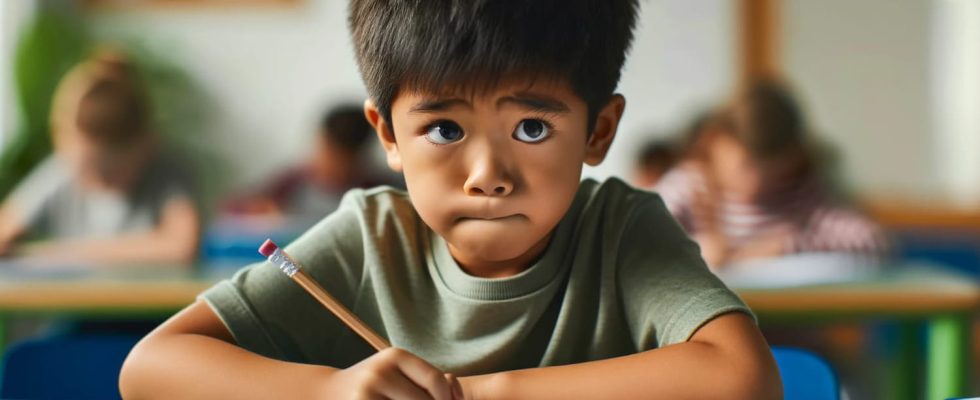We will always be surprised to see gifted children, often recognized as such by tests, that is to say objectively and not only by the blind love of their parents, become anxious at the idea of failing the test the next day, even though they know the lessons by heart, or not getting a good grade on their math homework, even though it is their favorite subject.
Generally speaking, they anticipate disasters and are terrified of them. Mediocre students who rely mainly on luck to avoid too bad a grade seem to them to be of another species; perhaps they envy them, but they will never recognize it.
What they wouldn’t give to take a light step, too, towards this control that freezes them with fear. It seems to them that their knowledge will disappear or become entangled in their minds to the point of becoming unusable.. Thus, in History, where they usually evolve with delight, dates, names, victories and defeats, treaties will become abstract data, in French, a subject in which they excel, the agreements of past participles and all of the grammar rules will escape their mastery and will have lost all meaning.
They are almost resigned to suffering this storm with each event that differs a little from the ordinary, since they do not know how to fight it, but they notice, with horror, that this pressure increases, even when it comes to Daily. Their distrust of themselves becomes overwhelming, they have no weapon with which to confront and overcome it and their parents also find themselves powerless to come to their aid.
The impression of being a tightrope walker, until then of admirable audacity and skill which were entirely natural to him, who has become, for no recognized reason, distressingly clumsy invades them entirely, they can no longer shake off from this image, they will lose their balance when they are at the very top and they will crash before the eyes of the horrified spectators, who have come especially for a marvelous acrobat and his aerial acrobatics.
They consider no other remedy than to further strengthen their preparation, to repeat what they already know by heart, to train with exercises similar to those they will have to carry out, but their fear is so great that it can become paralyzing and they will end up giving the image of a casual student who has not taken the trouble to revise because he is counting on his ease, which his teachers had clearly detected, that is to say -say the exact opposite of the reality experienced as a nightmare by the gifted child.
We can think that this notion of gift remains abstract: when we spoke to him about it, he was certainly reassured, he understood its functioning better, obscure points became clearer and his parents seemed to understand him better, but the intellectual gift as such remains an isolated idea, unrelated to a student’s daily life.
He doesn’t feel like he’s really worked: for example, at the beginning of Primary, it was enough for him to hear a recitation or read it once or twice to know it by heart and it seemed natural to him. almost like the table of 2 once the numbering is well integrated. He no longer even knows how he knew how to read, long before entering the Grande Ecole: everyone around him read, he did like everyone else, that’s, at least, what he thought before to realize that other children were obliged to learn gradually.
Now that he is more reasonable, he realizes that this is not natural: what entered his mind so easily could escape just as easily without him having any power over these movements. He is no longer only a tightrope walker who has become clumsy, but also an insect tirelessly restarting the pile of sand which collapses as soon as he has reached a certain height, still far from that which he desired to obtain, never assured of the solidity of its construction. Since this period of grace, so distant, he has become lucid, realistic, he opened his eyes and saw how the other children acted, he saw no one like him, he feels alone and without a model, his friends themselves… They even have to spend time learning their lessons, they ask for explanations and, for some, reading tires them.
This ease which seems to accompany it would perhaps only be fortuitous, due to a happy coincidence, it therefore escapes all will and all control. To preserve it and remain faithful to his image, the gifted child thinks that he is obliged to devote all his strength to his work. He sees himself as weak, ignorant, devoid of any experience, he even has the feeling that the other children know more than him, lost in his dreams and his almost metaphysical questions. He is afraid of appearing distracted, lost, of having forgotten the instructions for schoolchildren, of no longer understanding the questions. He has, moreover, bitter memories of times when he made a fool of himself because he did not understand an instruction that everyone else had applied without asking questions. He knows that these accidents can always happen, he must remain vigilant and build an unshakeable defense by leaving no gaps in his preparation.
Even then, he may still find himself trapped by a question that will leave him in complete uncertainty. The gifted child is endowed with an imagination which tends to amplify everything, both the extent of his ignorance, the consequences of his lack of reaction and his weakness in general, and the extreme complication of the questions he asks. will have to face. Indeed, everything is extreme for him. Very quickly, he can step out of reality and imagine the tortuous paths taken by teachers when they develop a test.
